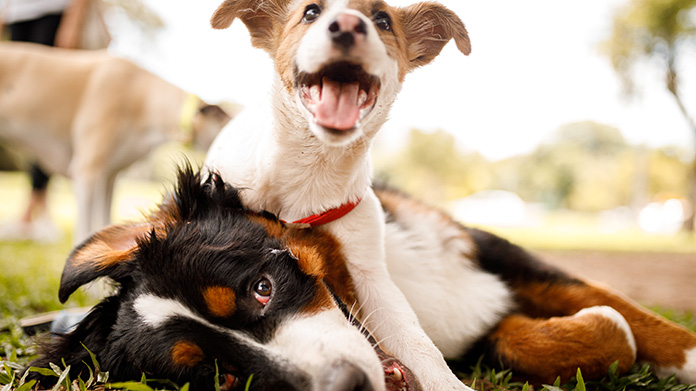Should I Start an LLC for My Dog Breeding Business?
Starting a limited liability company (LLC) for your dog breeding business can provide several benefits.
Most importantly, an LLC structure offers limited liability to its owners, which can protect their personal assets from lawsuits and creditors.
For a dog breeding business, lawsuits can arise from things like customer injury from one of your business’s dogs or negligence allegations (e.g., claims that you have mistreated your dogs, etc.).
LLCs are also affordable, highly flexible (from a tax point-of-view), and can make your dog breeding business seem more credible.

Interested in getting started? More than 84% of our readers form their LLC through a specialized LLC formation service in order to save time and avoid potential penalties.

Do I Need an LLC for My Dog Breeding Business?
LLCs are a simple and inexpensive way to protect your personal assets and save money on taxes.
You should form an LLC when there’s any risk involved in your business and/or when your dog breeding business could benefit from tax options and increased credibility.
LLC Benefits For a Dog Breeding Business
By starting an LLC for your dog breeding business, you can:
- Protect your savings, car, and house with limited liability protection
- Have more tax benefits and options
- Increase your business’s credibility
Limited Liability Protection
LLCs provide limited liability protection. This means your personal assets (e.g., car, house, bank account) are protected in the event your business is sued or if it defaults on a debt.
Example 1: One of your clients claims that a puppy they purchased from your dog breeding business had been spayed without their knowledge, and they threaten to sue your business. You believe that the employee that sold the puppy had disclosed this at the time, but you have since fired her and have no way of checking. Since you benefit from limited liability, the claimant will not be able to sue you personally in order to be compensated, regardless of how a claim progresses in court.
Example 2: When your customer’s child wanders off and attempts to pet one of your stud dogs, he becomes injured as a result of a vicious dog bite. When the parents threaten to bring a medical damages lawsuit against your LLC, you worry that you will be personally liable for the child’s injuries. Since your business is registered as an LLC, you will not be held personally liable for compensating the claiming party, assuming that it wasn’t your personal action that brought the claimant harm.
Example 3: You decide to acquire a small business loan in order to purchase more female breeding dogs, as well as your own stud. Since you didn’t personally guarantee the loan during its application, the lender will not be able to sue you in order to recoup their investment if your business is unable to pay them back.
Example 4: Dog breeding businesses can benefit from liability protection. When there is an accident or lawsuit that insurance doesn’t or won’t cover, a judge could order the liquidation of assets to cover damages.
An LLC will also protect your personal assets in the event of commercial bankruptcy or loan default.
To maintain your LLC’s limited liability protection, you must maintain your LLC’s corporate veil.
LLC Tax Benefits and Options for a dog breeding Business
LLCs, by default, are taxed as a pass-through entity, just like a sole proprietorship or partnership. This means that the business’s net income passes through to the owner’s individual tax return. The net income is then subject to income taxes (based on the owner’s tax bracket) and self-employment taxes.
Sole proprietorships and partnerships are taxed in a similar way to LLCs, but they do not offer limited liability protection or other tax options.
S Corp Option for LLCs
If a dog breeding business owner believes they’ll be paying themselves a reasonable salary and at least $10,000 in distributions each year, they might benefit from another LLC tax option, the S corporation (S corp) tax status.
S corp tax status for an LLC can help reduce self-employment and overall tax burden under the right circumstances.
Credibility and Consumer Trust
Dog breeding businesses rely on consumer trust. Credibility plays a key role in creating and maintaining any business.
Businesses that form LLCs gain a level of consumer trust and credibility simply by forming an LLC.
Launch Your LLC With Tailor Brands
More than 84% of our readers form their LLC through a specialized LLC formation service like Tailor Brands in order to save time and avoid potential penalties.
How to Form an LLC
Forming an LLC is easy. There are two options for forming your LLC:
- You can hire a trusted LLC formation service to set up your LLC (for a small fee)
- Or, choose your state from the list below to start an LLC yourself
Select Your State
- Alabama LLC
- Alaska LLC
- Arizona LLC
- Arkansas LLC
- California LLC
- Colorado LLC
- Connecticut LLC
- Delaware LLC
- Florida LLC
- Georgia LLC
- Hawaii LLC
- Idaho LLC
- Illinois LLC
- Indiana LLC
- Iowa LLC
- Kansas LLC
- Kentucky LLC
- Louisiana LLC
- Maine LLC
- Maryland LLC
- Massachusetts LLC
- Michigan LLC
- Minnesota LLC
- Mississippi LLC
- Missouri LLC
- Montana LLC
- Nebraska LLC
- Nevada LLC
- New Hampshire LLC
- New Jersey LLC
- New Mexico LLC
- New York LLC
- North Carolina LLC
- North Dakota LLC
- Ohio LLC
- Oklahoma LLC
- Oregon LLC
- Pennsylvania LLC
- Rhode Island LLC
- South Carolina LLC
- South Dakota LLC
- Tennessee LLC
- Texas LLC
- Utah LLC
- Vermont LLC
- Virginia LLC
- Washington LLC
- Washington D.C. LLC
- West Virginia LLC
- Wisconsin LLC
- Wyoming LLC
For most new business owners, the best state to form an LLC in is the state where you live and where you plan to conduct your business.
Do LLCs Need Insurance?
Yes. LLCs need business insurance in order to protect their business assets (e.g., dogs, purchase property, transportation vans, etc.). This is because limited liability protects the owners’ assets only.
Keep in mind that limited liability does not protect owners’ assets against tort or negligence claims that they are personally responsible for.
Common Situations Business Insurance May Cover for a Dog Breeding Business
Example 1: A customer comes to meet a new litter of puppies to find the perfect one to take home. She fails to see a hole in the yard and steps in it, breaking her ankle. General liability insurance would likely cover the cost of treating the injuries.
Example 2: One of the visitors to your property makes a sudden movement to pet one of your older dogs, startling the dog and leading to a dog bite injury. The visitor decides to take legal action, holding you liable for his injuries. Your general liability insurance policy would pay for the cost of your legal defense as well as any payout or settlement that is reached with the opposing party.
Example 3: The staircase leading down to your breeding area fails while a group of customers is walking down it. Several of them sustain injuries, including broken bones, and require medical care. The general liability insurance policy you carry would likely cover the cost of paying for the treatment of your customers’ injuries.
Other Types of Coverage Dog Breeding Businesses Need
While general liability is the most important kind of insurance to have, there are several other forms of coverage you should be aware of. Below are some other types of insurance most dog breeders should obtain:
Commercial Property Insurance
Depending on the size of your dog breeding operation, you may have invested a significant amount in your equipment and supplies. Should your business suffer a serious incident, like a fire or a storm, and you were to lose your property, it would be difficult to replace it out of pocket. A commercial property insurance policy helps to cover the costs of buying new equipment and supplies so that you can get back to doing business as quickly as possible.
Product Liability Insurance
There is always a risk that one or more of your customers will decide to take legal action against you — such as if a customer takes home a dog and the dog suffers from issues you are unaware of, such as extreme aggression. If the customer sues your business because of the dangerous behavior of the dog you sold, your product liability insurance will pay for your legal costs, including hiring an attorney to protect your interests and paying for a settlement if necessary.
In addition to the policies outlined above, there are a few other types of coverage that dog breeders may require depending on certain aspects of your operations. Some of these might not apply to you, so be sure to ask your agent which policies are right for your business.
Commercial Auto Insurance
If you have vehicles that you use primarily for business purposes, you need a commercial auto insurance policy. Your commercial auto insurance policy works much like your personal auto policy, providing protection against liability should you be involved in an accident. Not only will the policy pay for the repair or replacement costs for your vehicle, but it will also pay for treating your injuries or the injuries of others who were hurt in the accident.
Home-Based Business Insurance
If your dog breeding business is based out of your home, there is a chance that your homeowner’s insurance will not protect you in the event of accidents resulting from business activities. It is important to contact your homeowner’s insurance provider to determine what your current policy does cover for your business.
You should be able to get a home-based business insurance policy as part of a business owner’s policy or possibly as an extension of your current homeowner’s insurance policy.
Should I Start an LLC FAQ
The better business structure depends on your business’s unique circumstances and needs. However, unless your business is low profit and low risk, an LLC is likely the better option.
At a minimum, you will need general liability insurance.
Read our Dog Breeding Business Insurance article for more info.
The costs of starting and maintaining a dog breeding business can be substantial, although they are manageable. You will need to lease or purchase a facility for your dogs, purchase female dogs, purchase a male dog (or pay a stud fee), purchase dog food, and pay for all of the required shots and tests for the puppies.
Visit our How to Start a Dog Breeding Business guide to learn more about the costs of starting and maintaining this business.
Some of the operating costs for a dog breeding business include food for the dogs, veterinary bills, and insurance.
Visit our How to Start a Dog Breeding Business to learn more.
Dog breeding businesses may not be as popular as they used to be, but they still offer the potential for profit and a rewarding career. With low overhead and high-profit margins, dog breeders can turn their love for animals into a successful business.
Whether it be golden retrievers, poodles, or some other breed, many people have an interest in owning a particular type of dog. Responsible dog breeders meet this demand by providing healthy pets to consumers.
Visit our How to Start a Dog Breeding Business to learn more.


